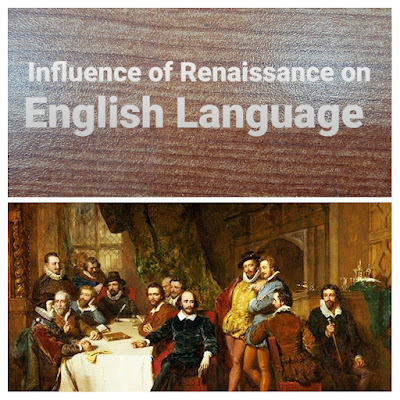Introduction:-
The final stage in the history of the development English language is the period of modern English from 1500 onwards. 1500 marks a similar turning point because of Renaissance. It alters the character of English Church and the establishment of Tudor dynasty which made England a nation in a real sense.
◘How the Renaissance had started?
In 1453 Constantinople, the seat of European learning, fell to the Turk. The scholars fled to Western Europe, bringing with them as much of their libraries as they could manage to rescue and transport. They settled at first mainly in Germany and Italy and started the intellectual awakening of Europe which has come to be known as the Renaissance.
The flood of the new learning reached England about the year 1500 and that it had a marked influence upon the language and literature. As to concern with language, development would have taken place without the impact of The Renaissance. But the new scholarship and all that is implied did produce new forces and add new words to the vocabulary.
It was a classical Renaissance and mainly a latin one, which had chief effect upon our vocabulary. We can see many English words of Latin origin or from Latin roots. It existed in middle English via French. Latin had not entirely unknown to the clergy and To The monk. It had very large part of church service and used for a number of medieval religious treaties and had very little direct effect upon the native tongue. For example word like., Confession, honour, melody, etc.
We also find new words direct from the Latin, and since the home of much of the new scholarship was Italy, Italian words also begin to make their appearance in English, especially in connection with music and the art.
Though the main importance of Renaissance was primarily religious and political, it had its effect upon the language as well. The bitter religious controversies produced numerous words and gained permanent niche in the vocabulary.
A very important outcome of the reformation was the various English translation of the Bible, the chief being Tyndale's in 1526, and more important, the authorised version in 1611. Tyndale brought under a strong Protestant tradition and fought shy of anything which might be constructed to suggest the Roman Church or justify its claims.
The translations of Bible has been a strong formative influence on the style of many eminent writer and played a definite part in shaping the literary language. It has provided us new words, which originated with the classical scholars, and adopted into spoken tongue and maintained in it. And secondly, it has provided new words which were early adopted into the spoken tongue and have remained in it ever since. The translators adopted a vocabulary which was predominantly native in character. The invention of printing was bound to have a far-reaching effect the development of the language. Three aspects of it is is noticed here.,
1. It tended to establish a standard language and discredit dialect. Each dialect had it on literature. Printing altered this and henceforth dialects board the brand of inferiority, and though they continued to be spoken they fell out of literary use.
2. It served to popularise and give currency to new coinages and newly introduced words.
3. It tended to fix spellings. The publication of Johnson's dictionary, what's the really decision factor but techstern managed to impose some kind of standardisation and to reduce the former chaos. But in doing this he was indirectly responsible for the differences between spelling and pronunciation. The spelling was more or less fixed by the end of 15th or the beginning of the sixteenth century, but the pronunciation has been constantly changing.
★ If we look at briefly towards these changes,we can observe some very vital points to take it into consideration while observing the influence of Renaissance upon the English language. Which are...
- Renaissance scholarship
- The religious controversies arising out of the reformation
- The various translations of the Bible
- The efflorescence of literature towards the end of the 16th century
- The emergence of national consciousness
- The discoveries of newlands by navigators
- Opening of trade
- The invention of printing
- Vocabulary
- Pronunciation
- Spelling
- Grammar
- The conjugational inflexions in plural verbs finally disappeared
- The possessive adjective it's had come into general use by the end of the 17th century in the place of his for neuter.
- Adding s in nouns was adopted as the method of forming the plural
- The degree changes by the simple addition of the suffixes -er and -est to the positive degree.





No comments:
Post a Comment